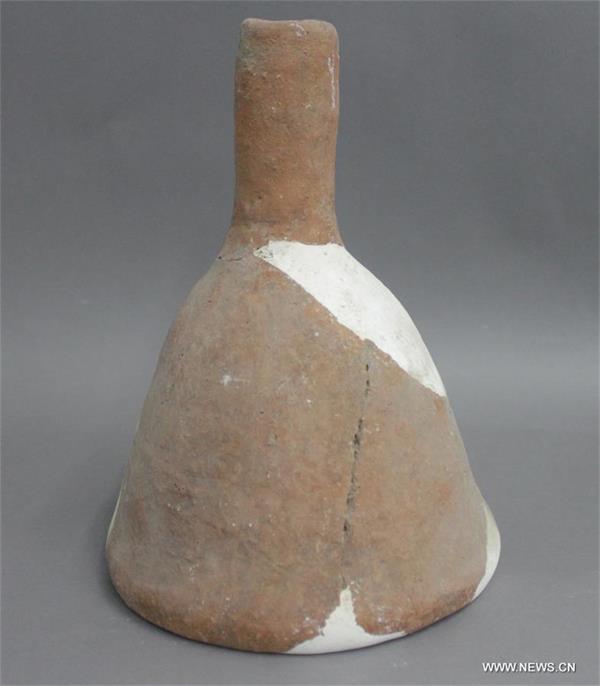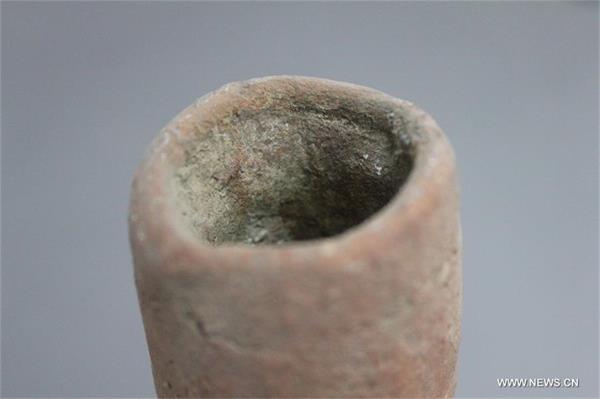


Photo provided by Jiajing Wang of the Stanford University shows the funnel for beer brewing from Mijiaya. People in ancient China might have started enjoying the delights of beer as far back as 5,000 years ago, according to the report released by Chinese and U.S. researchers. In the new study, researchers excavated two subterranean pits dated to around 3,400 to 2,900 B.C. at Mijiaya, an archaeological site near a tributary of the Wei River in northern China. [Photo: Xinhua]
Archaeologists have unearthed the earliest evidence of beer brewing in China. The newly-released archaeological evidence shows that Chinese people may have enjoyed the fun of beer as much as 5000 years ago.
The study conducted by Chinese and American researchers and published on May 23, uncovered a set of "beer-making tool" kits at Mijiaya, an archaeological site located in China's northwest city Xi'an. The kits include funnels, pots and specialized jugs.
The excavated kits date back to around 3400 to 2900 BC and are thought to be the oldest beer brewing facility discovered so far in China.
The shapes and styles of the vessels suggest they were used in three distinctive stages in the beer-making process: brewing, filtration, and storage.
According to the archaeologist's analysis, the residue found in the uncovered devices contain oxalate and phytolith, essential ingredients of "beerstone" (a beer-making byproduct that forms a grayish brown scale composed of calcium oxalate and organic substances formed on the inside surface of brewing apparatus), which is related to beer brewing.
Wang Jiajing, one of the report's researchers believed the beer produced by the excavated 5000-year-old beer-making kits is not exactly the same as modern beer. She said today's beer is mainly brewed from barley or wheat, but the beer made 5000 years ago is a mixture of millet, barley and a few tubers from plant roots.
"The interesting thing is the barley was not originally cultivated in China but was introduced into China from west Asia, which means the old beer recipe is a combination of Chinese tradition and western imports," Wang said.
In term of the taste of the beer, Wang said it is hard to speculate on the specific taste as we can not ascertain the beer's sugar contents. But she said based on the current discovery, the taste of the beer might be a little sour and sweet.
A researcher at an archaeology institute in Shaanxi province Xing Fulai said the find could advance the history of barley in China at least 1000 years.
Wang also added liquor was the significant element used in banquets and rituals organized by people in the high social classes, which means different social classes existed in China around 5000 years ago.
Beer is one of the oldest beverages humans have produced, it dates back to at least the fifth millennium BC and is recorded in the written history of ancient Egypt and Mesopotamia.
As any cereal containing certain sugars can undergo spontaneous fermentation due to wild yeast in the air, it is possible that beer-like beverages were independently developed throughout the world soon after a tribe or culture had domesticated cereals.
Chemical tests of ancient pottery jars reveal that beer was produced as far back as about 7,000 years ago in what is today Iran. This discovery reveals one of the earliest known uses of fermentation and is the earliest evidence of brewing to date.

Photo provided by Jiajing Wang of the Stanford University shows the residues from the interior surface of Mijiaya funnel. People in ancient China might have started enjoying the delights of beer as far back as 5,000 years ago, according to the report released by Chinese and U.S. researchers. In the new study, researchers excavated two subterranean pits dated to around 3,400 to 2,900 B.C. at Mijiaya, an archaeological site near a tributary of the Wei River in northern China. [Photo: Xinhua]
 French girl ties the knot with Chinese boy
French girl ties the knot with Chinese boy Beijing Style: ready for bare legs
Beijing Style: ready for bare legs Century-old station sees railyway evolution
Century-old station sees railyway evolution Enthusiasts perform Kung Fu at Wudang Mountain
Enthusiasts perform Kung Fu at Wudang Mountain Stunning photos of China's fighter jets in drill
Stunning photos of China's fighter jets in drill Monk's mummified body to be made into a gold Buddha statue
Monk's mummified body to be made into a gold Buddha statue Former Chinese solider of the French Foreign Legion seeks wife online
Former Chinese solider of the French Foreign Legion seeks wife online Asia's longest and highest suspension bridge to open to traffic
Asia's longest and highest suspension bridge to open to traffic China's first interactive robot looks like a beauty
China's first interactive robot looks like a beauty Top 20 hottest women in the world in 2014
Top 20 hottest women in the world in 2014 Top 10 hardest languages to learn
Top 10 hardest languages to learn 10 Chinese female stars with most beautiful faces
10 Chinese female stars with most beautiful faces China’s Top 10 Unique Bridges, Highways and Roads
China’s Top 10 Unique Bridges, Highways and Roads Can US win a new Cold War upon China?
Can US win a new Cold War upon China? China sitting on data goldmine
China sitting on data goldmine Experts say Sino-US space collaboration is likely to stay sci-fi
Experts say Sino-US space collaboration is likely to stay sci-fi Chinese NGOs receive less from overseas backers as new law stresses national security
Chinese NGOs receive less from overseas backers as new law stresses national securityDay|Week